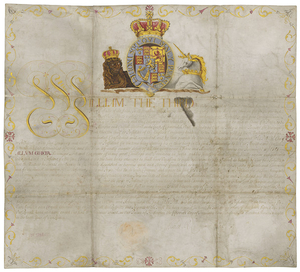WILLIAM III (1650-1702), King of England, Scotland and Ireland, prince of Orange. Document signed (at foot, 'William R'), illuminated letters patent appointing John Pitt as minister and consul general on the Coromandel Coast (SE India), Kensington...
WILLIAM III (1650-1702), King of England, Scotland and Ireland, prince of Orange. Document signed (at foot, 'William R'), illuminated letters patent appointing John Pitt as minister and consul general on the Coromandel Coast (SE India), Kensington Palace, 15 January 1698/9.
In English, 22 lines on vellum, 545 x 610mm, upper margin with blazoned achievement of the royal arms with lion and unicorn supporters, border with foliate and floral decorations in liquid gold and colours, first line with flourished initial and majuscules in gold (seal slits, lacking seal; rather soiled, especially along folds; ink stain to middle panel, minor old damp staining causing some cockling to right half, minor modern restorations on verso).
William appoints a representative of a new English trading company to India as president of the Coromandel Coast.
'Whereas Wee have thought fitt for the good and Benifitt of Our Subjects trading to the East Indies, and for the Better maintaining of Friendship and good Correspondence between our said Subjects an the Countryes with which they have Traffick and Commercie to ap[p]oint some fitt Person to be Our Minister and Consull Generall on the Coast of Cormandel, and Wee Judging that no Body is more Propper for this employment then the Cheif of President of the English Company tradeing to the East Indies residing there, we have therefore nominated ... John Pitt Esq ... to be Our Minister and Consull Generall on the Coast of Cormandel ... and Wee do in a friendly manner desire of all the Governours Officers and Ministers of the famous and Renowned Emperor ALLUM GHEIR Soveraigne Lord and Conqueror of many great Countryes and Dominions in India and his successors that they will kindly receive and give creditt to [him]'.
The presidency of the Coromandel Coast included the governorship of the main English trading station of Fort St George (modern Chennai). The document dates from the brief period in which English trade with India was deregulated, allowing the establishment in 1698 of a new 'English Company Trading to the East Indies' to compete with the established East India Company. When John Pitt arrived at Fort St George in August 1799, he was confronted with the recently-appointed representative of the senior East India Company, who was, confusingly, his own cousin Thomas Pitt (known as 'Diamond' Pitt, 1653-1726, grandfather of Pitt the Elder, 1st Earl of Chatham): tensions between the cousins and their rival companies were to last for several years. The two trading companies were to be merged in 1708.
View it on
Sale price
Estimate
Time, Location
Auction House
WILLIAM III (1650-1702), King of England, Scotland and Ireland, prince of Orange. Document signed (at foot, 'William R'), illuminated letters patent appointing John Pitt as minister and consul general on the Coromandel Coast (SE India), Kensington Palace, 15 January 1698/9.
In English, 22 lines on vellum, 545 x 610mm, upper margin with blazoned achievement of the royal arms with lion and unicorn supporters, border with foliate and floral decorations in liquid gold and colours, first line with flourished initial and majuscules in gold (seal slits, lacking seal; rather soiled, especially along folds; ink stain to middle panel, minor old damp staining causing some cockling to right half, minor modern restorations on verso).
William appoints a representative of a new English trading company to India as president of the Coromandel Coast.
'Whereas Wee have thought fitt for the good and Benifitt of Our Subjects trading to the East Indies, and for the Better maintaining of Friendship and good Correspondence between our said Subjects an the Countryes with which they have Traffick and Commercie to ap[p]oint some fitt Person to be Our Minister and Consull Generall on the Coast of Cormandel, and Wee Judging that no Body is more Propper for this employment then the Cheif of President of the English Company tradeing to the East Indies residing there, we have therefore nominated ... John Pitt Esq ... to be Our Minister and Consull Generall on the Coast of Cormandel ... and Wee do in a friendly manner desire of all the Governours Officers and Ministers of the famous and Renowned Emperor ALLUM GHEIR Soveraigne Lord and Conqueror of many great Countryes and Dominions in India and his successors that they will kindly receive and give creditt to [him]'.
The presidency of the Coromandel Coast included the governorship of the main English trading station of Fort St George (modern Chennai). The document dates from the brief period in which English trade with India was deregulated, allowing the establishment in 1698 of a new 'English Company Trading to the East Indies' to compete with the established East India Company. When John Pitt arrived at Fort St George in August 1799, he was confronted with the recently-appointed representative of the senior East India Company, who was, confusingly, his own cousin Thomas Pitt (known as 'Diamond' Pitt, 1653-1726, grandfather of Pitt the Elder, 1st Earl of Chatham): tensions between the cousins and their rival companies were to last for several years. The two trading companies were to be merged in 1708.



